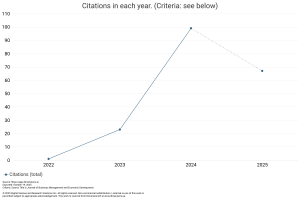Enhancing Environmental Performance through Green HRM and Employee Green Behavior: Evidence from Hospitality Industry
DOI:
https://doi.org/10.59653/jbmed.v3i02.1495Keywords:
Employee Green Behavior, Environmental Performance, Hospitality Industry, Green Human Resource ManagementAbstract
This study aims to analyze the impact of Green Human Resource Management (GHRM) on Environmental Performance, with Employee Green Behavior acting as a mediating variable within the hospitality industry in Semarang. Data were collected through questionnaires distributed to 200 permanent hotel employees selected using purposive sampling. The data were analyzed using Structural Equation Modeling (SEM) with AMOS 24 software. The findings reveal that: (1) GHRM has a positive and significant effect on Environmental Performance (β = 0.386; C.R. = 4.725; p < 0.05); (2) GHRM positively and significantly influences Employee Green Behavior (β = 0.452; C.R. = 5.138; p < 0.05); (3) Employee Green Behavior exerts a positive and significant effect on Environmental Performance (β = 0.394; C.R. = 4.892; p < 0.05); and (4) Employee Green Behavior partially mediates the relationship between GHRM and Environmental Performance (indirect effect = 0.178; C.R. = 3.967; p < 0.05). The research model competes well with empirical data (CMIN/DF = 2.341; GFI = 0.921; AGFI = 0.903; CFI = 0.947; TLI = 0.938; RMSEA = 0.067). These findings underscore the critical role of integrating environmental considerations into human resource management practices to enhance hotels' environmental performance by fostering pro-environmental behavior among employees.
Downloads
References
Albertini, E. (2013). Does environmental management improve financial performance? A meta-analytical review. Organization & Environment, 26(4), 431–457. https://doi.org/https://doi.org/10.1177/1086026613510301
Dumont, J., Shen, J., & Deng, X. (2017). Effects of green HRM practices on employee workplace green behavior: The role of psychological green climate and employee green values. Human Resource Management, 56(4), 613–627. https://doi.org/https://doi.org/10.1002/hrm.21792
Dyah Palupiningtyas, Retno Mulatsih, Sulistyowati, & Andar Sri Sumantri. (2024). The Role Of Green HRM In Talent Management Development To Improve Employee Performance In Hospitality Companies. International Journal of Economics and Management Research, 3(1), 246–252. https://doi.org/10.55606/ijemr.v3i1.185
Dyah Palupiningtyas, & Sri Mulyani Wahono. (2023). Green Human Resource Management: A Comprehensive Analysis of Practices, Impacts, and Future Directions. International Conference on Digital Advance Tourism, Management and Technology, 1(1), 01–07. https://doi.org/10.56910/ictmt.v1i1.6
Guerci, M., Longoni, A., & Luzzini, D. (2016). Translating stakeholder pressures into environmental performance – the mediating role of green HRM practices. The International Journal of Human Resource Management, 27(2), 262–289. https://doi.org/https://doi.org/10.1080/09585192.2015.1065431
Gupta, H., Rao, P., & Govindaraju, M. (2019). Antecedents and consequences of green human resource management practices: Evidence from hospitality industry. Journal of Hospitality Marketing & Management, 28(7), 809–828. https://doi.org/https://doi.org/10.1080/19368623.2019.1567952
Jabbour, C. J. C., & Jabbour, A. B. L. de S. (2016). Green human resource management and green supply chain management: Linking two emerging agendas. Journal of Cleaner Production, 112, 1824–1833. https://doi.org/https://doi.org/10.1016/j.jclepro.2015.01.052
Kim, Y. J., Kim, W. G., Choi, H.-M., & Phetvaroon, K. (2019). The effect of green human resource management on hotel employees' eco-friendly behavior and environmental performance. International Journal of Hospitality Management, 76, 83–93. https://doi.org/https://doi.org/10.1016/j.ijhm.2018.04.007
Lankoski, L. (2000). Determinants of environmental profit: An analysis of the firm-level relationship between environmental performance and economic performance. In Helsinki University of Technology. http://lib.tkk.fi/Diss/2000/isbn9512280574/
Norton, T. A., Parker, S. L., Zacher, H., & Ashkanasy, N. M. (2015). Employee green behavior: A theoretical framework, multilevel review, and future research agenda. Organization & Environment, 28(1), 103–125. https://doi.org/https://doi.org/10.1177/1086026615575773
Ones, D. S., & Dilchert, S. (2012). Environmental sustainability at work: A call to action. Industrial and Organizational Psychology, 5(4), 444–466. https://doi.org/https://doi.org/10.1111/j.1754-9434.2012.01478.x
Paillé, P., Chen, Y., Boiral, O., & Jin, J. (2014). The impact of human resource management on environmental performance: An employee-level study. Journal of Business Ethics, 121(3), 451–466. https://doi.org/https://doi.org/10.1007/s10551-013-1732-0
Pham, N. T., Tučková, Z., & Jabbour, C. J. C. (2019). Greening the hospitality industry: How do green human resource management practices influence organizational citizenship behavior in hotels? Tourism Management, 72, 386–399. https://doi.org/https://doi.org/10.1016/j.tourman.2018.12.008
Ren, S., Tang, G., & Jackson, S. E. (2018). Green human resource management research in emergence: A review and future directions. Asia Pacific Journal of Management, 35(3), 769–803. https://doi.org/https://doi.org/10.1007/s10490-017-9532-1
Renwick, D. W. S., Redman, T., & Maguire, S. (2013). Green human resource management: A review and research agenda. International Journal of Management Reviews, 15(1), 1–14. https://doi.org/https://doi.org/10.1111/j.1468-2370.2011.00328.x
Saeed, B. B., Afsar, B., Hafeez, S., Khan, I., Tahir, M., & Afridi, M. A. (2019). Promoting employee's proenvironmental behavior through green human resource management practices. Corporate Social Responsibility and Environmental Management, 26(2), 424–438. https://doi.org/https://doi.org/10.1002/csr.1694
Semarang, B. P. S. K. (2020). Kota Semarang Dalam Angka 2020. BPS Kota Semarang, 51, 358.
Semarang, D. K. dan P. K. (2020). Direktori hotel dan akomodasi lain Kota Semarang tahun 2020. Dinas Kebudayaan Dan Pariwisata Kota Semarang.
Sugiyono. (2017). Metode penelitian kuantitatif, kualitatif, dan R&D. Alfabeta.
Tian, H., Zhang, J., & Li, J. (2020). The relationship between pro-environmental attitude and employee green behavior: The role of motivational states and green work climate perceptions. Environmental Science and Pollution Research, 27(7), 7341–7352. https://doi.org/https://doi.org/10.1007/s11356-019-07393-z
Trang, T. T. H., Lee, J.-S., & Han, H. (2020). Understanding customer green decision-making in the hotel industry: A choice experiment with corporate social responsibility as a trade-off attribute. International Journal of Hospitality Management, 87. https://doi.org/https://doi.org/10.1016/j.ijhm.2020.102497
Trumpp, C., Endrikat, J., Zopf, C., & Guenther, E. (2015). Definition, conceptualization, and measurement of corporate environmental performance: A critical examination of a multidimensional construct. Journal of Business Ethics, 126(2), 185–204. https://doi.org/https://doi.org/10.1007/s10551-013-1931-8
Utami, A. P., & Palupiningtyas, D. (2024). From Values to Practices: Unveiling the Dynamics of Organizational Culture in the Implementation of Green HRM in Semarang Hotels. International Journal of Economic, Finance and Business Statistics (IJEFBS), 2(3), 169–186. https://doi.org/https://doi.org/10.59890/ijefbs.v2i3.1857
Yong, J. Y., Yusliza, M.-Y., Ramayah, T., & Fawehinmi, O. (2020). Nexus between green intellectual capital and green human resource management. Journal of Cleaner Production, 215, 264–374. https://doi.org/https://doi.org/10.1016/j.jclepro.2019.12.306
Downloads
Published
How to Cite
Issue
Section
License
Copyright (c) 2025 Lain Masa Laia, Dyah Palupiningtyas

This work is licensed under a Creative Commons Attribution-ShareAlike 4.0 International License.
Authors who publish with this journal agree to the following terms:
- Authors retain copyright and grant the journal right of first publication with the work simultaneously licensed under a Creative Commons Attribution-ShareAlike that allows others to share the work with an acknowledgement of the work's authorship and initial publication in this journal.
- Authors are able to enter into separate, additional contractual arrangements for the non-exclusive distribution of the journal's published version of the work (e.g., post it to an institutional repository or publish it in a book), with an acknowledgement of its initial publication in this journal.
- Authors are permitted and encouraged to post their work online (e.g., in institutional repositories or on their website) prior to and during the submission process, as it can lead to productive exchanges, as well as earlier and greater citation of published work (See The Effect of Open Access).





























